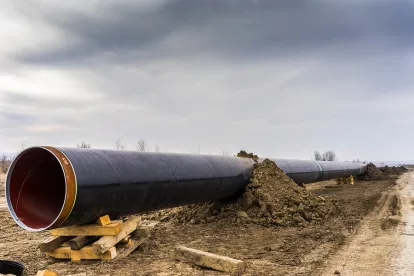On April 2, 2019, the Federal Energy Regulatory Commission (“FERC” or “Commission”) determined that the one-year statutory limit on state review of interstate natural gas pipeline company applications for water quality certification was a bright-line deadline that could not be extended by private agreement.[1] FERC found that the New York State Department of Environmental Conservation’s (“NYDEC”) failure to act within one year of receipt of a water quality certification application submitted by National Fuel Gas Supply Corporation and Empire Pipeline, Inc. (together, “National Fuel”) constituted waiver of the State’s authority under Section 401 of the Clean Water Act[2] to make a final determination on the application. Section 401 limits such review to one year or less from the date of receipt of the application. The Commission rejected contentions by the NYDEC and Sierra Club that the NYDEC could extend the date by which it could act on a water quality certification application. The Commission’s Order will arguably restrict states’ ability to review water quality certification applications associated with interstate natural gas pipeline projects, may actually lead to uncertainty for entities proposing to construct such pipeline facilities, and will test the Commission’s interpretations of Section 401 and related case law.
Background
Entities proposing to construct interstate natural gas pipelines are subject to a myriad of state and federal permitting requirements, statutes and regulations. For instance, pursuant to Section 7(c) of the Natural Gas Act,[3] an entity seeking to construct and operate an interstate natural gas pipeline or extension subject to the Commission’s jurisdiction must first receive from FERC a certificate of public convenience and necessity. Additionally, Section 401(a)(1) of the Clean Water Act requires an applicant for a federal permit to conduct any activity including, but not limited to, the construction or operation of any facilities that could result in any discharge into navigable waters to first receive water quality certification from the state in which the discharge will originate. Under Section 401(a)(1), if the state (or responsible state agency) fails or refuses to act on a request for certification within one year from the date of receipt of the application, the certification requirement is waived.
On March 17, 2015, National Fuel applied to FERC for a certificate of public convenience and necessity to construct and operate a proposed 99‑mile pipeline project (and related facilities) in Pennsylvania and New York (i.e., the Northern Access 2016 Project). On March 2, 2016, the NYDEC received National Fuel’s application for water quality certification associated with the project. On January 20, 2017, National Fuel and the NYDEC mutually agreed to revise the date on which the application was deemed “received” by the agency, from March 2, 2016 to April 8, 2016, presumably in order to extend the one-year deadline for the NYDEC to act on the application under Section 401. The NYDEC denied National Fuel’s application on April 7, 2017.
In the Waiver Order, the Commission, as part of its review of the pipeline project, determined that under Section 401, the NYDEC was required to have acted on the application by March 2, 2017 (i.e., one year from the actual date it received National Fuel’s application), notwithstanding its bilateral agreement with National Fuel to alter the receipt date from March 2, 2016 to April 8, 2016[4] Thus, the Commission concluded that the NYDEC had waived its authority to issue a water quality certification under Section 401.
The NYDEC and Sierra Club subsequently sought rehearing of the Waiver Order, contending, among other things, that the Commission’s interpretation of Section 401 in the Waiver Order was erroneous. For example, the NYDEC argued that the Commission incorrectly applied principles of statutory construction when it found that the one-year deadline imposed in Section 401 cannot be altered by agreement.[5] The NYDEC and Sierra Club cited several cases to support the position that courts have concluded that Section 401 does not prohibit parties from altering the date an application for water quality certification is “received.”[6] Further, the NYDEC contended that the Waiver Order encourages a “withdraw and refile” practice (in order to restart the one-year review period), which would cause more delay than would occur by simply allowing parties to agree to extend the one-year deadline.[7] The NYDEC also claimed that the Commission erred in not giving any weight to NYDEC’s agreement with National Fuel to extend the certification deadline.[8] The Commission flatly rejected these arguments in the Rehearing Order.
The Rehearing Order
On April 2, 2019, the Commission denied the NYDEC’s and Sierra Club’s requests for rehearing on several grounds.
a. Statutory Interpretation
The Commission found that the NYDEC’s agreement with National Fuel to extend the date on which National Fuel’s application for water quality certification was deemed “received” contravened the plain language of Section 401. Section 401(a)(1) provides that if a state “fails or refuses to act on a request for [water quality] certification within a reasonable period of time (which shall not exceed one year) after receipt of such request,” then the certification requirement is waived.[9] The Commission stated that it has long interpreted this language to mean that a certifying agency waives the certification requirements of Section 401 if the certifying agency does not act within one year after the date it actually receives a request for a certification.[10]
The Commission gave plain meaning to the words “after receipt of such request[,]” explaining that Section 401 “contains no provision authorizing either the Commission or the parties to extend the statutory deadline” and that “private agreements . . . cannot operate to amend the Clean Water Act, nor are they in any way binding on the Commission.”[11] Further, the Commission found unpersuasive the NYDEC’s contention that statutory rights are waivable unless Congress affirmatively provides they are not. The Commission pointed to Hoopa Valley Tribe v. FERC,[12] in which the court considered whether waiver occurs when there is a written agreement with the reviewing state to delay water quality certification. The court held that such an agreement constituted a failure and refusal to act under Section 401.[13] The Commission determined that the NYDEC’s agreement to extend the date by which National Fuel’s application was deemed “received” suffered from the same fatal defect as a similar agreement at issue in Hoopa Valley Tribe, and thus the NYDEC waived its authority to issue a water quality certification. Further, according to the Commission, validating the NYDEC’s extension of the action deadline would contravene Congressional intent of establishing a statutory policy of preventing a state’s “dalliance or unreasonable delay.”[14]
Additionally, FERC rejected Sierra Club’s claims that Constitution Pipeline Co. v. New York State Department of Environmental Conservation, 868 F.3d 87 (2d Cir. 2017) and New York State Department of Environmental Conservation v. FERC, 884 F.3d 450 (2d Cir. 2018) demonstrate that “courts . . . concluded Section 401 allows the parties to move the date an application is ‘received’”[15] The Commission stated that in neither case did the court hold that the state and an applicant could agree to move the date an application is “received.”[16] In Constitution Pipeline, the court found that it lacked jurisdiction to address the waiver issue and simply noted that the applicant had withdrawn and resubmitted an application for certification. Moreover, New York State Department of Environmental Conservation addressed whether a state may defer the date of “receipt” by deeming an application “incomplete.”[17] There, the court found that such an approach was contrary to the plain language of the statute. The court also noted that a state could request that the applicant withdraw and resubmit the application in order to alter the “receipt” date. However, the Commission noted that the “withdrawal-and-resubmission scheme” may no longer be viable in light of Hoopa, which was issued after New York State Department of Environmental Conservation.
b. Policy
The Commission rejected the NYDEC’s argument that the Waiver Order encourages a “withdraw and refile” practice, and would, therefore, cause more delay than simply allowing agreements to extend the deadline because (i) the refiling would require the agency to issue notice of the new application, and (ii) the new filing would extend the deadline up to a year.[18] The Commission reiterated that Section 401 requires the state to issue a certification within a reasonable period of time, not to exceed one year, and includes language expressly providing for waiver in the absence of action within one year, the purpose of which is to prevent delay.[19] The Commission stated that the responsibility to act within one year lies with the NYDEC, and that attempts to blame the Commission for not facilitating extensions of time are “misguided.”[20] Thus, the policy interests advanced by the NYDEC cannot override the statute, and fail to recognize countervailing considerations, such as the interest in providing certainty around the deadline for state action.
c. Recognition of Private Agreements
The Commission also rejected the NYDEC’s contention that the Commission erred in not giving weight to the private agreement between the NYDEC and National Fuel to alter the “receipt” date. The NYDEC cited Erie Boulevard Hydropower, LP v. FERC[21] as support for the position that the Commission must give weight to the contracts and settlements of the parties before it. The Commission rejected this contention, finding that unlike in the National Fuel proceeding, Erie Boulevard Hydropower did not involve an agreement that contravened the intent behind a statutory provision. Additionally, consistent with Hoopa Valley Tribe, National Fuel and the NYDEC cannot enter into a written agreement to delay water quality certification.[22]
Considerations Moving Forward
The National Fuel orders highlight FERC’s view that a state is not permitted under Section 401 of the Clean Water Act to extend the date by which an application for water quality certification is deemed “received,” regardless of any private agreement to alter the receipt date. The orders suggest that the Commission will consider any inaction by a state within Section 401’s one-year statutory deadline as a strict waiver of state review of a certification application, which will undoubtedly affect states’ ability to review Section 401 applications. However, the Commission’s determinations are likely to be appealed to an appellate court, which will test the Commission’s interpretation of Section 401 and the Commission’s reliance on, among other things, Hoopa Valley Tribe. For instance, it remains to be seen whether the “withdrawal-and-resubmission scheme” can be used by states to circumvent the one-year deadline provided for in Section 401, which the Commission acknowledged may be in flux in light of Hoopa Valley Tribe. Such a scheme, if permitted, would provide states with a safety valve to extend their review of Section 401 applications, but would cause considerable uncertainty for pipeline companies seeking to plan and construct new facilities. Until further clarity from the courts can be provided, states should endeavor to complete their Section 401 review within one year, or else risk having FERC deem the state review waived.
[1] National Fuel Gas Supply Corp., 167 FERC ¶ 61,007 (2019) (“Rehearing Order”); National Fuel Gas Supply Corp., 164 FERC ¶ 61,084 (2018) (“Waiver Order”).
[2] 33 U.S.C. § 1341(a)(1) (2012).
[3] 15 U.S.C. § 717f(c) (2012).
[4] Waiver Order, 164 FERC ¶ 61,084 at P 42.
[5] National Fuel Gas Supply Corp., NYDEC Request for Rehearing and Stay, Docket No. CP15-115-000, at pp. 2, 5-6 (filed Aug. 14, 2018) (“NYDEC Rehearing Request”).
[6] See, e.g., Constitution Pipeline Co. v. New York State Dep’t of Envtl. Conservation, 868 F.3d 87, 94 (2d Cir. 2017); New York State Dep’t of Envtl. Conservation v. FERC, 884 F.3d 450, 456 (2d Cir. 2018).
[7] NYDEC Rehearing Request at p. 7.
[8] Id. at pp. 7-8.
[9] 33 U.S.C. § 1341(a)(1).
[10] Rehearing Order, 167 FERC ¶ 61,007 at P 8.
[11] Id. (citing Central Vt. Pub. Serv. Corp., 113 FERC ¶ 61,167, at P 16 (2005); Waiver Order, 164 FERC ¶ 61,084 at P 43).
[12] 913 F.3d 1099 (D.C. Cir. 2019).
[13] Id. at 1104.
[14] Id. at 1104-5 (quoting 115 Cong. Rec. 9264 (1969) (quotation omitted)).
[15] National Fuel Gas Supply Corp., Request for Rehearing and Stay of Sierra Club, Docket No. CP15-115-000, at p. 6 (filed Sept. 5, 2018).
[16] Rehearing Order, 167 FERC ¶ 61,007 at P 13.
[17] Id. (citing New York State Dep’t of Envtl. Conservation, 884 F.3d at 456).
[18] Id. at P 18.
[19] Id. at P 19 (citing Hoopa, 913 F.3d at 1104-05).
[20] Id.
[21] 878 F.3d 258, 268 (D.C. Cir. 2017).
[22] Rehearing Order, 167 FERC ¶ 61,007 at P 24.




 />i
/>i

